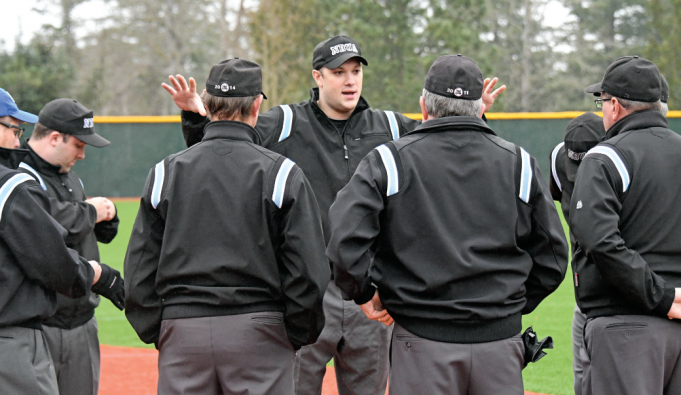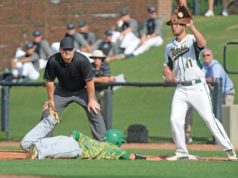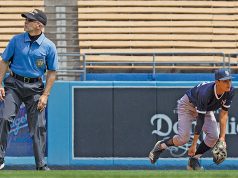For roughly the first half of my amateur umpiring career — which lasted from 1966-2016 — umpires could go about their business without having to deal with rating systems or any significant degree of supervision. Every so often an assigner would call us in on the carpet because some coach had gotten lathered up about something, but otherwise no one paid much attention to what we did on the field. We got nice game assignments (or didn’t) and advanced (or didn’t) based on things like word of mouth, friendship with assigners and luck.
In the local chapter which I first joined at age 17, I jumped from Division 5 straight to Division 2 in my first year. This had nothing to do with ability; the umpire who got me started was on the board of directors, hated another board member who had arranged that same move for his 17-year-old son and saw to it that his protégé (me) enjoyed the same privilege. That’s how one could advance back then.
This system had its advantages. We didn’t have to walk on eggshells for fear of making a mistake that may cost us points in an evaluation. Also, we could resort to self-help in dealing with unruly players without fearing the consequences. Strike zones could magically expand with a griping hitter or shrink to postage-stamp size with a pitcher who acted like he was at the Academy Awards. One veteran college umpire called three straight balks on a pitcher who yapped about a ball four call in the ninth inning of a tied game. Boom! Game over.
But there were downsides to this system as well. Some umpires had no clue about rules and mechanics, and never gave more than a halfhearted effort because they knew they would get good assignments no matter what. In youth ball, I had partners who leaned up against a fence between innings and smoked a cigarette. This didn’t benefit the game, to say the least.
Now we’ve done an about-face and are in the age of accountability. Things changed for college umpires a few years ago. Now, others are being subjected to performance standards and assessed based on complex metrics. Some may not welcome this, but it’s not going to change; if anything, assessment will become even more rigorous. Should we fear this or embrace it? I vote for the latter. Close scrutiny of our work may send shivers down some spines, but it makes us get better and, approached properly, can be an opportunity for us to shine.
When it comes to others’ perception of our work, there are things we can’t control. Who’s the evaluator? What’s his or her background? What preconceived notions may he or she have about us? What mood is he or she in that day? And so on. But there’s a lot we can control. There’s an old saying that success is a function of preparation meeting opportunity. This means the more we do to better ourselves in the various phases of umpiring, the greater the odds we can achieve any goals we have when that preparation meets the opportunity afforded by an evaluation system. Assuming, of course, it’s a sound system.
Do you fear being downgraded for carrying extra weight? Shed it.
For not being on top of rules or mechanics? Get in the books and study guides. Form study groups with other umpires.
For being less than stellar in positioning, plate stance, signals, etc.? Watch video. Ask advice from top-flight umpires in your area. Experiment in front of a mirror.
For not adeptly handling a situation that arises? There are tons of study guides on communication and game management available today; use them. Attend clinics, not to network or because you have to, but to learn.
If you hone your skills and craft a positive image, you’ll have the confidence to think, “I’ve got this!” if an evaluator shows up. Because you may not know when that will be, assume one will be at any game you work and give 100 percent effort. I know a fledgling umpire who dogged it in a scrimmage and, when an evaluator met with him afterward, told him, “Gee, if I had known you were here I’d have worked harder.” Not good for career-building.
Knowing an evaluator is on hand may increase your pulse rate; that’s normal. A thorough pregame (which you always need) should enhance the feeling of preparation that you hopefully already have. As you take the field, tell yourself it’s just another day at the office. When I was a college football referee, my umpire said this before we went out for the coin toss in each of the 121 games we worked together and it always relaxed both of us. Don’t worry that your career will go kaput if you make a mistake; every evaluator I’ve known assessed based on a body of work, not one play or pitch in one inning.
Don’t change how you usually do things, for this may take you out of your comfort zone. Don’t be so anxious to impress with your hustle that you hyperactively dart here and there; looking like you’re overdoing it, or phony, isn’t a plus. Focus on looking relaxed and in control by moving in a brisk, cruise-control, purposeful manner; often, less is more.
If you’ve got the dish, think about slow, rhythmical, consistent timing. In the first inning, watch warmup pitches — hopefully you do this regularly — for the sooner it feels like “game on” the quicker you’ll settle down. Then take a deep breath and get after it. Once the first pitch is thrown you’ll forget that anyone is watching you.
Later, if the evaluator meets with you, don’t have a “yes, but” answer to comments. Be receptive; he or she has likely been around the block and may have something beneficial to offer. Based on years as a supervisor and evaluator of officials, I guarantee this: Being branded as someone “who doesn’t take criticism well” can negate any positives that came out of the evaluation itself.
Jon Bible, Austin, Texas, worked seven NCAA Division I College World Series. He is the 2019 recipient of the National Collegiate Umpire Award from the National College Baseball Hall of Fame.
What's Your Call? Leave a Comment:
Note: This article is archival in nature. Rules, interpretations, mechanics, philosophies and other information may or may not be correct for the current year.
This article is the copyright of ©Referee Enterprises, Inc., and may not be republished in whole or in part online, in print or in any capacity without expressed written permission from Referee. The article is made available for educational use by individuals.


















